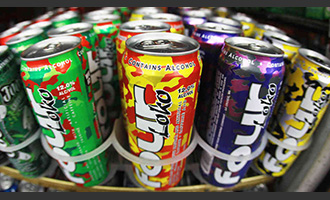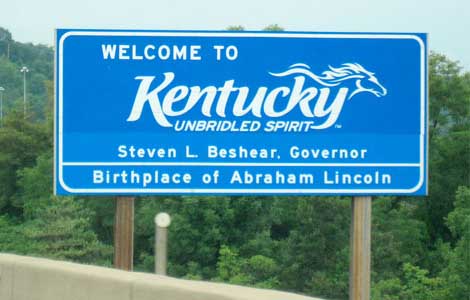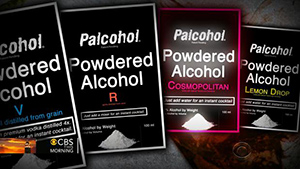Blog
Search
Blog
New Study: Increased Harm, Risky Behaviors Among Underage Alcopop Drinkers
- Details
- Created: Monday, March 16 2015 11:38

Underage drinkers who exclusively drink supersized alcopops or pre-mixed/ready-to-drink cocktails are more likely to engage in heavy episodic drinking and suffer from alcohol-related injuries, according to a new report in the American Journal of Public Health. The study provides clear evidence linking alcopops to higher risk of alcohol-related harm among youth.
Alcopops are sweet, fizzy, flavored alcoholic beverages, designed to appeal to youth. Supersized alcopops such as Four Loko, Joose, and Mike's Harder often contain higher alcohol content than traditional beer, and in 24-oz. cans, may contain the equivalent of 4-5 standard drinks per single-serving container.
The study's authors advise that policymakers should consider ways to keep these harmful alcohol products away from youth. To learn more about how to reduce access and availability of alcopops to youth, visit the Stop Alcopops campaign page.
Victory: Kentucky Passes Bill to Protect Three-tier System
- Details
- Created: Monday, March 09 2015 12:51

A-B InBev's attempt and successful purchase of the Owensboro distributorship prompted strong opposition from public health advocates , independent distributors, craft brewers, and labor unions, and was a catalyst for HB 168. The bill garnered bipartisan support from legislative leaders including bill author and House Speaker Greg Stumbo (D-Prestonsburg), Senate President Robert Stivers (R-Manchester), State Senator John Schickel (R-Union), and Governor Steve Beshear. The governor has indicated that he will sign the bill .
More of the 12 states without such three-tier protection may soon follow suit. Tennessee has also proposed legislation that would close a loophole allowing brewers to own distributorships.
TTB Approves Labels for Powdered Alcohol; States Take Action
- Details
- Created: Wednesday, March 11 2015 14:18

March 25: Utah enacts a ban on powdered alcohol - the 5th state to do so since early 2014.
March 23: Eleven more states introduced bills to ban powdered alcohol since our original post. The Massachusetts ABC issued a regulatory decision declaring the product illegal.
The U.S. Alcohol & Tobacco Tax & Trade Bureau approved labels for the powdered alcohol product Palcohol again this week - almost a year after initially issuing, and then revoking, approval in April 2014. Since then, four states (Louisiana, South Carolina, Vermont, & Virginia) have passed legislation to ban powdered and crystalline alcohol products, and the Pennsylvania liquor control board voted unanimously to keep powdered alcohol off of its product lists. Alaska placed a ban on powdered alcohol in 1980. Both Delaware and Michigan have added powdered alcohol to their definitions of alcoholic beverage products, but have not yet banned it (Michigan has proposed legislation to do so). At least fourteen more states are currently considering bills to enact powdered alcohol bans.
Of the four states to enact powdered alcohol bans since 2014, Louisiana prohibits containers with powdered alcohol from being sold in or shipped into the state. Virginia bans containers of powdered alcohol being sold in or shipped out of the state, as well as individual possession, purchase, and sale of powdered alcohol. Vermont bans both possession and sale of powdered alcohol, and specifies penalties and amounts for fines. South Carolina made it unlawful for individuals to use, offer for use, purchase, offer to purchase, sell, offer to sell, or possess powdered alcohol; banned licensed on- and off-premise outlets from using powdered alcohol; and specified fine amounts for repeated violations.
Bill sponsors and supporters cite a long list of health and safety concerns including: easy youth access to the packets; similar size and shape of packets to nonalcoholic children's drink packets; combining multiple packets to make a single drink; mixing powder alcohol with liquid alcohol; mixing powdered alcohol with energy drinks; concealment by underage drinkers attending events/locations where alcohol is prohibited; and ingestion of the product by snorting.
Visit our Dangerous Products legislative activity page to find current bills on powdered alcohol, as well as caffeinated alcohol products and increased allowable amounts of alcohol by volume.
Read our letter asking California legislators to ban powdered and crystalline alcohol products.
TAKE ACTION: Send a letter to California legislators telling them to ban powdered alcohol.
More Articles ...
Subcategories
Help us hold Big Alcohol accountable for the harm its products cause.
| GET ACTION ALERTS AND eNEWS |
STAY CONNECTED    |
CONTACT US 24 Belvedere St. San Rafael, CA 94901 415-456-5692 |
SUPPORT US Terms of Service & Privacy Policy |
Copyright © 2026 Alcohol Justice. All Rights Reserved.
Joomla! is Free Software released under the GNU General Public License.


